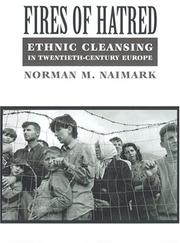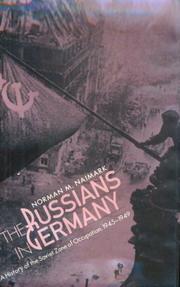| Listing 1 - 10 of 37 | << page >> |
Sort by
|
Book
ISBN: 0691147841 0691152381 1282721933 1400836069 9786612721939 Year: 2010 Publisher: Princeton Princeton University Press
Abstract | Keywords | Export | Availability | Bookmark
 Loading...
Loading...Choose an application
- Reference Manager
- EndNote
- RefWorks (Direct export to RefWorks)

ISBN: 0674003136 9780674003132 Year: 2001 Publisher: Cambridge (MA) : Harvard University Press,
Abstract | Keywords | Export | Availability | Bookmark
 Loading...
Loading...Choose an application
- Reference Manager
- EndNote
- RefWorks (Direct export to RefWorks)
Bevolkingsverplaatsingen --- Déplacements de population --- Exchange of population --- Interchange of population --- Population -- Transferts --- Population exchanges --- Population interchanges --- Population transfers --- Transfer of population --- Transferts de population --- Échange de population --- Racism --- Population transfers. --- Political atrocities --- Racisme --- Atrocités politiques --- History --- Histoire --- Europe --- Ethnic relations. --- Relations interethniques --- 327 --- -Population transfers --- -Atrocities --- Cleansing, Ethnic --- Ethnic cleansing --- Ethnic purification --- Exchanges, Population --- Interchanges, Population --- Purification, Ethnic --- Transfers, Population --- Emigration and immigration --- Minorities --- Bias, Racial --- Race bias --- Race prejudice --- Racial bias --- Prejudices --- Anti-racism --- Race relations --- Buitenlandse betrekkingen. Buitenlandse politiek. Internationale betrekkingen. Internationale politiek. Wereldpolitiek --- -Europe --- -Buitenlandse betrekkingen. Buitenlandse politiek. Internationale betrekkingen. Internationale politiek. Wereldpolitiek --- 327 Buitenlandse betrekkingen. Buitenlandse politiek. Internationale betrekkingen. Internationale politiek. Wereldpolitiek --- -Cleansing, Ethnic --- Atrocités politiques --- Atrocities --- 20th century --- Ethnic relations --- Critical race theory --- Racism - Europe - History - 20th century --- Political atrocities - Europe --- Europe - Ethnic relations
Book
ISBN: 9780691152387 Year: 2012 Publisher: Princeton Princeton university press
Abstract | Keywords | Export | Availability | Bookmark
 Loading...
Loading...Choose an application
- Reference Manager
- EndNote
- RefWorks (Direct export to RefWorks)
STALIN, JOSEPH -- 341.23 --- POLITICAL PERSECUTION -- 341.23

ISBN: 0674784057 9780674784062 Year: 1996 Publisher: Cambridge, Mass. Belknap Press
Abstract | Keywords | Export | Availability | Bookmark
 Loading...
Loading...Choose an application
- Reference Manager
- EndNote
- RefWorks (Direct export to RefWorks)
Communism and culture --- Germany (GDR) --- History of Germany and Austria --- anno 1940-1949 --- Sozialistische Einheitspartei Deutschlands. --- Germany (East) --- Politics and government. --- Economic policy. --- Social policy.
Book
ISBN: 0190637714 9780190637712 9780199765263 019976526X 9780199765270 0199765278 0190637722 Year: 2017 Publisher: New York, NY : Oxford University Press,
Abstract | Keywords | Export | Availability | Bookmark
 Loading...
Loading...Choose an application
- Reference Manager
- EndNote
- RefWorks (Direct export to RefWorks)
Book
ISBN: 0914710508 Year: 1979 Publisher: New York (N.Y.) : Columbia university press,
Abstract | Keywords | Export | Availability | Bookmark
 Loading...
Loading...Choose an application
- Reference Manager
- EndNote
- RefWorks (Direct export to RefWorks)
Book
ISBN: 3549055994 Year: 1997 Publisher: Berlin Propyläen
Abstract | Keywords | Export | Availability | Bookmark
 Loading...
Loading...Choose an application
- Reference Manager
- EndNote
- RefWorks (Direct export to RefWorks)
History of Germany and Austria --- anno 1940-1949 --- Germany (GDR)
Book
ISBN: 0674874641 Year: 1983 Publisher: London : Harvard University Press,
Abstract | Keywords | Export | Availability | Bookmark
 Loading...
Loading...Choose an application
- Reference Manager
- EndNote
- RefWorks (Direct export to RefWorks)
Bibliotheek François Vercammen
Book
ISBN: 9780674238770 Year: 2019 Publisher: Cambridge, Massachusetts : The Belknap Press of Harvard University Press,
Abstract | Keywords | Export | Availability | Bookmark
 Loading...
Loading...Choose an application
- Reference Manager
- EndNote
- RefWorks (Direct export to RefWorks)
The Cold War division of Europe was not inevitable--the acclaimed author of Stalin's Genocides shows how postwar Europeans fought to determine their own destinies. Was the division of Europe after World War II inevitable? In this powerful reassessment of the postwar order in Europe, Norman Naimark suggests that Joseph Stalin was far more open to a settlement on the continent than we have thought. Through revealing case studies from Poland and Yugoslavia to Denmark and Albania, Naimark recasts the early Cold War by focusing on Europeans' fight to determine their future. As nations devastated by war began rebuilding, Soviet intentions loomed large. Stalin's armies controlled most of the eastern half of the continent, and in France and Italy, communist parties were serious political forces. Yet Naimark reveals a surprisingly flexible Stalin, who initially had no intention of dividing Europe. During a window of opportunity from 1945 to 1948, leaders across the political spectrum, including Juho Kusti Paasikivi of Finland, Wladyslaw Gomulka of Poland, and Karl Renner of Austria, pushed back against outside pressures. For some, this meant struggling against Soviet dominance. For others, it meant enlisting the Americans to support their aims. The first frost of Cold War could be felt in the tense patrolling of zones of occupation in Germany, but not until 1948, with the coup in Czechoslovakia and the Berlin Blockade, did the familiar polarization set in. The split did not become irreversible until the formal division of Germany and establishment of NATO in 1949. In illuminating how European leaders deftly managed national interests in the face of dominating powers, Stalin and the Fate of Europe reveals the real potential of an alternative trajectory for the continent. --
Cold War. --- Stalin, Joseph, --- North Atlantic Treaty Organization. --- Communist countries --- Europe --- Soviet Union --- Boundaries. --- History --- Politics and government --- Foreign relations --- Politique et gouvernement --- Guerre froide. --- Relations extérieures --- Staline, Joseph,
Book
ISBN: 0674242920 0674242912 067423877X 0674292154 Year: 2019 Publisher: Cambridge, MA : Harvard University Press,
Abstract | Keywords | Export | Availability | Bookmark
 Loading...
Loading...Choose an application
- Reference Manager
- EndNote
- RefWorks (Direct export to RefWorks)
It can seem as though the Cold War division of Europe was inevitable. But Stalin was more open to a settlement on the continent than is assumed. In this powerful reassessment of the postwar order, Norman Naimark returns to the four years after WWII to illuminate European leaders' efforts to secure national sovereignty amid dominating powers.
Cold War. --- Stalin, Joseph, --- North Atlantic Treaty Organization. --- Communist countries --- Europe --- Soviet Union --- Boundaries. --- History --- Politics and government --- Foreign relations --- Alcide De Gasperi. --- Allied Control Council. --- Austrian State Treaty. --- Berlin Airlift. --- Bornholm. --- Enver Hoxha. --- Ernst Reuter. --- Italian Elections 1948. --- Molotov. --- Origins of Cold War. --- Palmiro Togliatti. --- Porkkala. --- Postwar Europe. --- Sokolovskii. --- Zhdanov and Finland.
| Listing 1 - 10 of 37 | << page >> |
Sort by
|

 Search
Search Feedback
Feedback About UniCat
About UniCat  Help
Help News
News